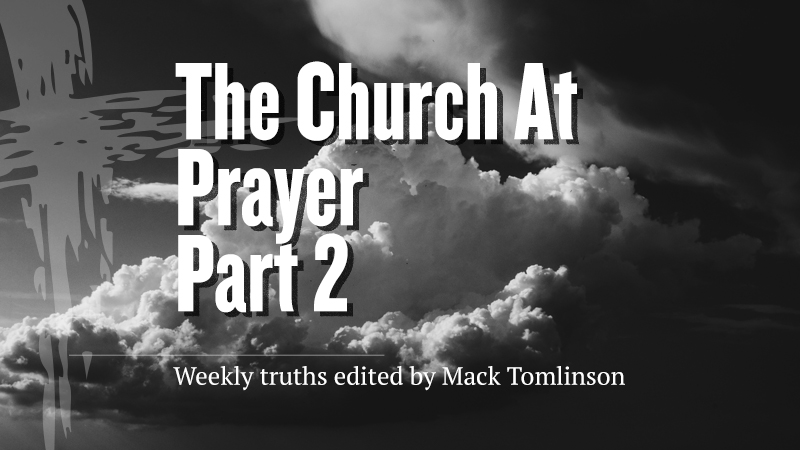
4. THEIR OCCUPATION
In those ten days they were given to prayer and to claiming the promise of the Spirit. Only one other item occupied their attention and that only for a brief space — the election of Matthias.
Prayer had the priority in those days. It may have seemed to their enemies and to unbelievers round about them that they were doing nothing. But the eyes of the angels were upon that little band and all heaven was agog with interest.
The professing church today has often got her priorities all wrong. A church is not esteemed a live church unless it pursues a ceaseless round of activities. Much of the present-day church operates purely and solely on the horizontal plane — in the same way as a Rotary Club or a Social Service Bureau to the neglect of the vertical. But unless we look up to God in heaven, we can never work effectually on the earth below. Even evangelicals are sometimes at fault. Martyn Lloyd-Jones pointed this out very strikingly when he said:
We need less traveling by jet planes from congress to congress, less marching in the streets, and more kneeling and praying and pleading to God to have mercy upon us, more crying to God to arise and scatter his enemies and make himself known.
Our Lord and his apostles laid tremendous emphasis on prayer. Indeed, the whole Bible does so. And we do not have our priorities right if prayer is crowded out. There are two or three features of these prayer meetings which Luke stresses. The first is the unanimity of the participants. They were of different backgrounds. Some had been fishermen, one a tax collector, and one a Zealot–a member of a fanatical Jewish party that strove for an independent Jewish state and was prepared to use force to secure its ends. But now there were welded together to strive with one soul for their Lord and his cause.
The phrase ‘with one accord’ represents one Greek word — a word used eleven times by Luke in Acts and occurring only once elsewhere in the New Testament. It is used some six times of unanimity in Christian circles, but it is also used some three times of the unanimity of the forces of evil in attacks upon Stephen and upon Paul.
John Elias said: ‘Union is the strength and the glory of the church. There is union and concord in hell against us. May we withstand them by a stronger and better union — yea, union in the Lord.’ Where this precious grace of unanimity prevails among the people of God, it sheds a sweet fragrance and is refreshing as the dew of heaven (Psalm 133). O that with one accord we may glorify the God and Father of our Lord Jesus Christ! (Rom 15:6).
There is another expression used by Luke in describing this praying band. It is the word ‘continued’ which is better rendered ‘continued steadfastly’ in prayer. It has the idea of devotion and also of perseverance; it is used some nine times by Luke and Paul, and only once elsewhere in the New Testament (in Mark 3:9). It is no strange thing if Luke and Paul should use the same form of speech — they were companions for some periods of time. Luke uses it of the apostles when they refused to be distracted to ‘the serving of tables’ and insisted on ‘giving themselves to prayer and the ministry of the word.’ The Westminster divines in their Form of Government laid down the rule with regard to a pastor: ‘First, it belongs to his office to pray for and with his flock as the mouth of the people unto God (Acts 6:4), where preaching and prayer are joined as several parts of the same office.’
Calvin comments on Acts 6:4 as follows: ‘Pastors must not think they have so done their duty that they need to do no more when they have daily spent some time in teaching. There is another manner of study, there is another manner of zeal required . . . Therefore it shall not suffice to take great pains in teaching unless we ask the blessing at the hands of the Lord, that our labour may not be in vain and unfruitful. Hereby it appears that zeal in prayer is not in vain commended to the ministers of the word.’
Our Lord urged this zeal upon us again and again — for example, in the parable of the unjust judge. And Paul said: ‘Pray without ceasing.’ It is said of one of those present in these prayer-meetings in Acts 1 that he was so often on his knees that they became ‘hard as camels’ knees’.
God grant us the Spirit’s aid that we may show more devotion and perseverance in this noble art of prayer!
5. ANSWERED PRAYER
It is written of Jabez that ‘God granted him that which he requested.’ So it was with those gathered in the upper room, and so it has been times without number.
At the Kirk of Shotts on June 21, 1630, l was preaching. Alexander Smellie tells us that ‘no fewer than 500 men and women, some of them ladies of high estate and others poor wastrels and beggars, traced the dawn of the undying life to the preacher’s words that day.’ Livingston left it on record that ‘he spent the night before in prayer and conference with some of God’s people.’
In Kilsyth on 23 July, 1839, W. C. Burns preached and the meeting went on from 10 a.m. to 3 p.m. The Spirit’s power seemed to carry all before it. Burns heard later that ‘some of the people of God in Kilsyth had been longing and wrestling for a time of refreshing from the Lord’s presence and had during much of the preceding night been travailing in birth for souls . . .’
In the wide parish of Connor in County Antrim in 1858, there were on an average over a hundred prayer-meetings each week, and blessing followed not only in that parish but far beyond.
John Foster said: ‘If the whole or the greater number of the disciples of Christianity were to combine that heaven should not withhold one single influence which the very utmost of conspiring and persevering supplication would obtain, it would be a sign that a revolution of the world was at hand.’
O that we might be watchmen upon the walls of Zion, acting as the Lord’s remembrancers, taking no rest and giving him no rest, till he establish and till he make his cause a praise in the earth (Isaiah 62:6-7). O that by grace we might say of Zion with Timothy Dwight:
For her my tears shall fall,
For her my prayers ascend,
To her my cares and toils be given,
Till toils and cares shall end.
– W. J. Grier
